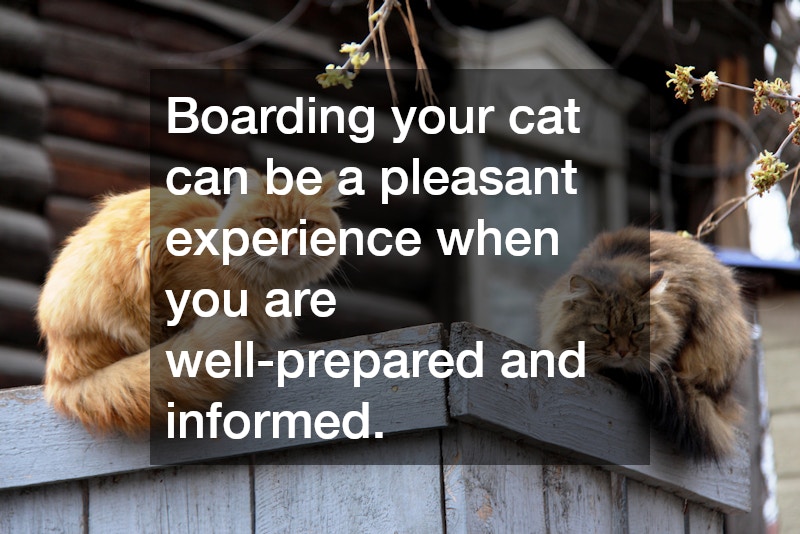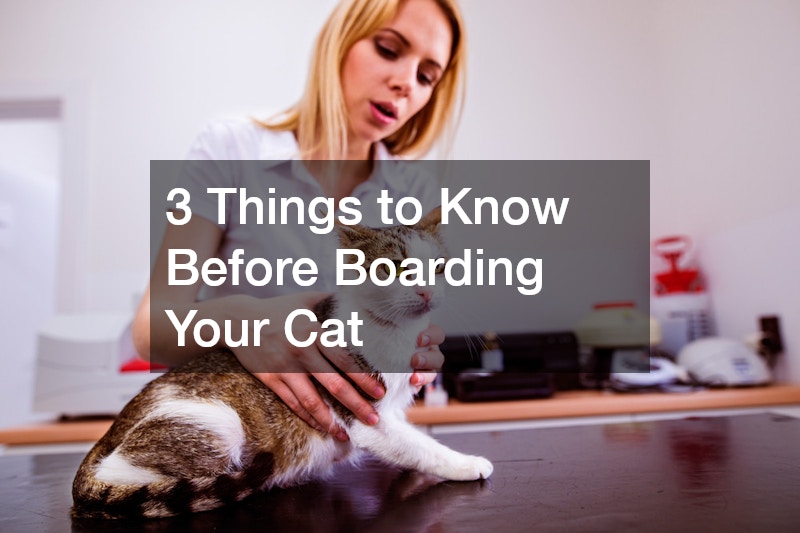
When preparing for cat boarding, it’s important to be well-informed about the process. Ensuring a safe and comfortable environment for your cat is essential. Here are three crucial things every cat owner should know before deciding to board their pet.
1. How to Choose the Right Boarding Facility
1.1 Facility Reputation and Reviews
Check online reviews and ask for recommendations from trusted sources to gauge the reputation of the cat boarding facility. A well-reviewed facility can provide reassurance about the quality of care. Social media platforms and pet forums can also be insightful resources for honest feedback.
Finding the right boarding facility involves visiting potential places and observing firsthand. See how staff interact with animals and the general ambiance of the facility. Your comfort level with the facility will impact your peace of mind while you’re away.
1.2 Facility Cleanliness and Safety
Visit the facility for a tour to assess the cleanliness standards and safety measures in place for boarded animals. A clean facility is essential for preventing the spread of diseases. Look for separate areas for cats and dogs to minimize stress on your feline friend. Pay attention to the hygienic practices of the staff and the condition of the enclosures. Regular sanitation processes should be evident in all areas accessible to animals.
1.3 Staff Qualifications and Interaction
Ensure that the facility employs trained staff who can interact positively with your cat and address their needs. Ask about their experience and any specialized training they possess. Professional handling can greatly influence your cat’s boarding experience.
Warm and caring interactions between staff and animals create a bond of trust. Staff should display patience and affection in their handling of cats. It’s beneficial if the facility offers personalized attention and regularly checks on the well-being of each cat.
2. Understanding Your Cat’s Needs and Behavior
2.1 Assessing Temperament and Socialization
Consider your cat’s temperament and how well they interact with strangers and other animals. Some cats thrive in social environments, whereas others may require more solitude. Understanding their behavioral tendencies will aid in selecting the best boarding arrangement.
Cats that are anxious or fearful may need special attention in cat boarding facilities to ensure they are not overwhelmed. Ask facilities if they offer customizable care plans to suit various temperaments. Identifying these needs in advance prevents distress during their stay.
2.2 Dietary Requirements and Feeding Schedules
Communicate your cat’s specific dietary needs and feeding schedule to the boarding facility. Unique dietary needs require precise adherence to prevent health issues. Therefore, it’s critical that the staff are diligent in maintaining these routines.
Reach out ahead of time to ensure that specialty diets, like grain-free or prescription foods, can be accommodated. Carry enough of your cat’s regular food that will last through the boarding period. Familiar foods can reduce stress from abrupt diet changes.
2.3 Health Considerations and Veterinary Records
Ensure that your cat’s vaccinations are up-to-date and provide any necessary medical records to the facility. Facilities require proof of vaccinations to protect all boarded animals from illnesses. Check specific vaccine requirements when planning for boarding. Veterinary check-ups prior to boarding can help identify any health concerns.
3. Preparing Your Cat for Boarding
3.1 Familiarizing Your Cat with Travel Carriers
Make your cat comfortable with the travel carrier to reduce stress during transport to the boarding facility. Allow your cat to explore the carrier at home before the trip. Positive associations with the carrier ensure a smoother journey to the boarding facility.
Encourage your cat to spend short, relaxing periods inside the carrier. Offer treats and toys while they’re inside to promote comfort. The goal is to associate the carrier with safety and calmness.
3.2 Comfort Items and Familiar Scents
Pack comfort items like a favorite toy or blanket to provide familiar scents that will soothe your cat during their stay. These items help ease separation anxiety and reinforce familiarity in foreign environments. Scents from home can be particularly comforting during the adjustment period.
Observe your cat’s preferences for certain textures or scents when selecting these items. Their favorite comforts will provide a sense of security while they are away from home. Observing how they rely on these items at home can also guide your choices.
Boarding your cat can be a pleasant experience when you are well-prepared and informed. By choosing the right facility, understanding your cat’s needs, and preparing in advance, you can ensure your cat’s safety and well-being while you’re away. The comfort and health of your cat should always be a priority, allowing you to leave with confidence and peace of mind.

